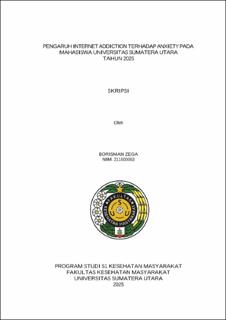| dc.description.abstract | In today's digital age, internet addiction has become a global phenomenon that affects mental health, particularly among students. Internet addiction has been linked to various psychological issues, one of which is anxiety. Almost every day, we are connected to the internet, placing most people at a certain risk of developing internet addiction. Internet addiction can manifest in various forms, including excessive use of social media, online shopping addiction, gaming, or pornography. Such behaviours can lead to anxiety, depression, sleep deprivation, social isolation, and physical health issues. The aim of this study is to investigate the impact of internet addiction on anxiety among students at the University of North Sumatra in 2025. This study is a quantitative and analytical survey using a cross-sectional design. The sampling technique used in this study is two-stage cluster random sampling with a sample size of 269. Data were collected using the Internet Addiction Test (IAT) questionnaire and the Hamilton Anxiety Rating Scale (HARS), which were analysed using simple linear regression statistical tests. The results of the study indicate that there is a positive influence of internet addiction on anxiety among students at the University of North Sumatra in 2025, with a p-value of 0.00 < α = 0.05 and t-calculated > t-table (10.588 > 1.65251). Students are advised to be more mindful and prudent in their use of the internet to avoid addiction and anxiety | en_US |


